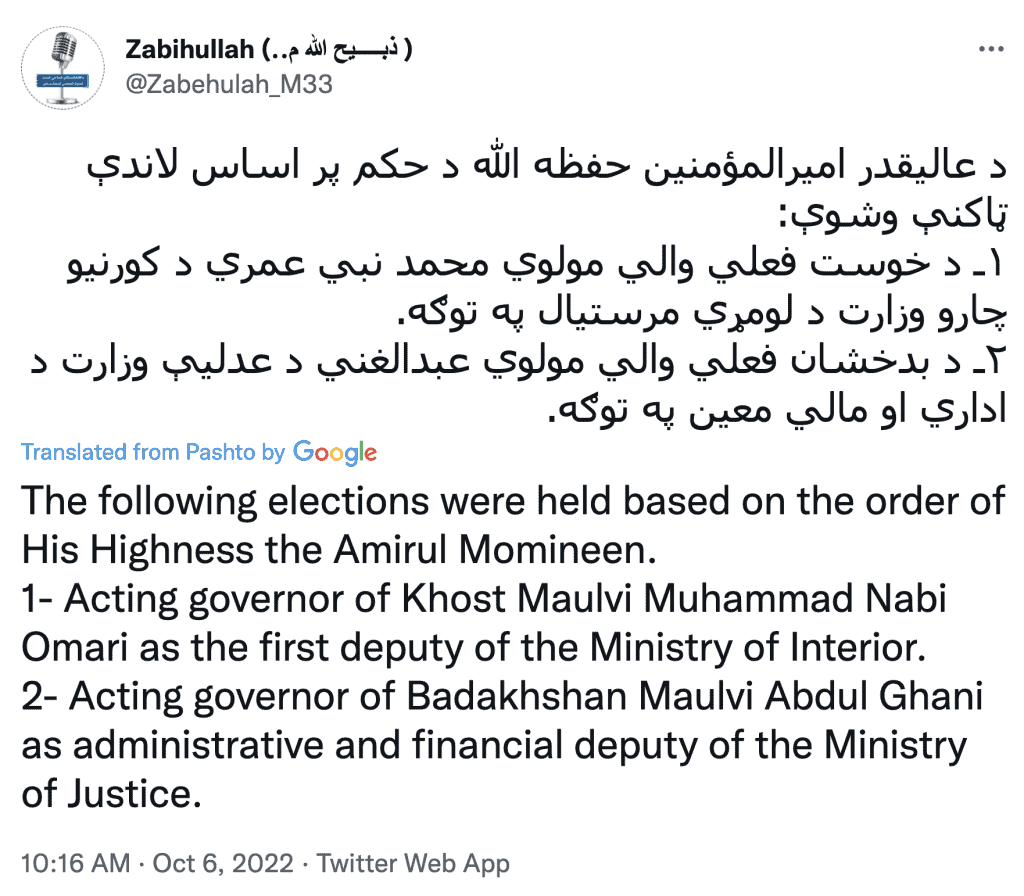
The Taliban has named Mohammad Nabi Omari, a former Guantanamo Bay detainee who is also a senior leader in the Haqqani Network and maintains close ties to Al Qaeda, to serve as its “first deputy” to Sirajuddin Haqqani, the Minister of the Interior. Omari was one of the notorious “Gitmo Five” detainees who were freed in exchange for Bowe Bergdahl, a U.S. soldier who deserted his post and was captured by the Taliban. His appointment highlights Sirajuddin’s consolidation of power in Afghanistan’s interior ministry.
Taliban spokesman Zabihullah Mujahid announced Omari’s appointment on Oct. 6, 2022 along with the shuffling of other appointments, including provincial governors and other key Taliban leadership positions. Omari previously served as the Taliban’s governor of Khost, one of several important provinces in eastern Afghanistan that is dominated by the Haqqani Network [see LWJ report, Taliban’s government includes designated terrorists, ex-Guantanamo detainees].
Omari is one of several key Haqqani Network leaders to be appointed to top level posts in the Taliban’s new government. In addition to Sirajuddin, who is the minister of interior, Khalil al Rahman Haqqani is the minister of refugees, Mullah Taj Mir Jawad is the first deputy of intelligence, and Haji Mali Khan is the governor of Logar.
Omari was captured by U.S. forces in Afghanistan in 2002, detained at their prison in Bagram, then transferred to the Guantanamo Bay detention facility, where he was held up until 2014. After he was freed, Omari was transferred to Qatar, where he continued to work with the Taliban and even served on the Taliban’s negotiating team with the U.S.
Omari has a long history of supporting the Taliban and its dangerous subgroup, the Haqqani Network, which is listed by the U.S. as a Foreign Terrorist Organization for its close ties to Al Qaeda and other terror group.
Prior to his time in U.S. custody, according to Joint Task Force Guantanamo (JTF-GTMO), Omari “was a senior Taliban official who served in multiple leadership roles.” Omari was allegedly a “member of a joint al Qaeda/Taliban” cell in Khost “and was involved in attacks against U.S. and Coalition forces.” [For a profile on Omari, see LWJ report, Sgt. Bowe Bergdahl exchanged for top 5 Taliban commanders at Gitmo.]
He was also a “close associate” of Jalaluddin Haqqani, Sirajuddin’s father who passed away in 2018, and worked with the Haqqani Network. Sirajuddin, who is listed by the U.S. as a Specially Designated Global Terrorist for his ties to Al Qaeda and other terror groups, serves as the one of Taliban’s two deputy leaders and is the Islamic Emirate of Afghanistan’s interior minister. Sirajuddin is arguably the most powerful and influential Taliban leader and has also been described by the United Nations Sanction and Monitoring Team as “an Al Qaeda Leader.”
Omari’s son, Abdul Haq, was killed during fighting in Khost province in July. Like his father, Abdul Haq fought for the Haqqani Network. The Taliban celebrated Abdul Haq’s “martyrdom” in a statement on Voice of Jihad, noting that the group’s leaders, including its emir, Mullah Haibatullah Akhundzada, were willing to lose their sons in their campaign to conquer Afghanistan. Akhundzada’s son killed himself in a 2017 suicide attack that targeted Afghan security forces in Helmand province.







